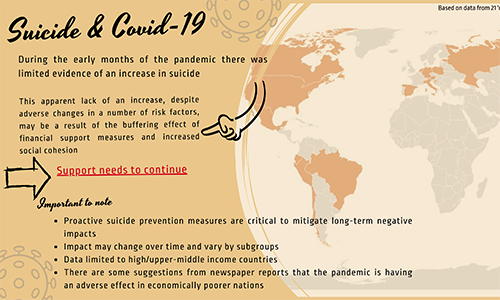A new observational study is the first to examine suicides occurring during the early phase of the COVID-19 pandemic in multiple countries and finds that suicide numbers largely remained unchanged or declined in the pandemic’s early months.
The study, led by an international team including University of Bristol researchers, is published in The Lancet Psychiatry journal.
The survey found that in high-income and upper-middle-income countries – suicide numbers have remained largely unchanged or have declined in the early months of the pandemic, compared with expected levels.
However, the authors stress that governments must remain vigilant as the longer-term mental health and economic effects of the pandemic unfold and be poised to respond if the situation changes.
The study looked at numbers of suicides in 21 countries between 1 April and 31 July 2020 and compared these with trends in the previous one to four years.
The authors note that – while their study provides the best available evidence on the pandemic’s effects on suicide so far – it only provides a snapshot of the first few months of the pandemic and effects on suicide might not necessarily occur immediately.
Lead author, Professor Jane Pirkis, Director of the Centre for Mental Health at the University of Melbourne, Australia, says: “We need to continue to monitor the data and be alert to any increases in suicide, particularly as the pandemic’s full economic consequences emerge. Policymakers should recognise the importance of high-quality, timely data to support suicide prevention efforts, and should work to mitigate suicide risk factors associated with COVID-19, such as the heightened levels of stress and financial difficulties that some people may experience as a result of the pandemic. Increasing mental health services and suicide prevention programmes, and providing financial safety nets may help to prevent the possible longer-term detrimental effects of the pandemic on suicide.”







